Resident Scholarship
Our internal medicine residents are involved with many scholarly activities. Because we are technically a "community hospital" program, we sometimes are asked by applicants if we can provide the same academic opportunities as a university-based residency. Let us assure you that there are numerous opportunities for clinical or educational research for interested residents!
Many of our residents achieve publications during their residency training and all have opportunities to present their research, quality improvement work or interesting clinical vignettes at regional and national meetings. Residents have easy access to research mentors and opportunities to participate in anything from a small-scale resident-led research project to a large multi-site clinical trial.
Residents receive research support through our Center for Outcomes Research and Evaluation (CORE). In addition to offering our residents opportunities for health services research, CORE provides expert assistance with study design, data management and statistical support. Moreover, CORE personnel can assist with proposal development to reduce the administrative burden on project investigators. Finally, CORE provides resident research education through regular curricular offerings and a 6-week optional biostatistics education course.
Department of Internal Medicine Research
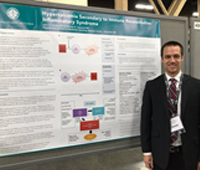 |
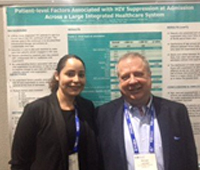 |
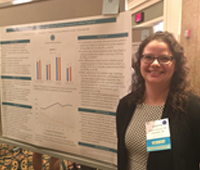 |
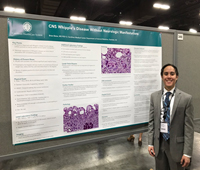 |
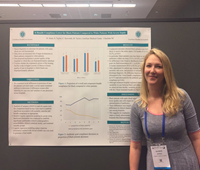 |
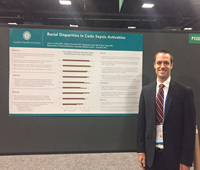 |
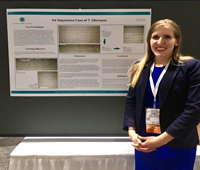 |
Resident Testimonials: Research and Scholarly Activity
"A major advantage of CMC is the relatively small number of residents paired with a huge health system that includes many faculty doing high level research. When I expressed my interest in gastroenterology, the GI faculty and fellows were incredibly enthusiastic about my interest and quickly hooked me into interesting work they had ongoing. I was able to get research abstracts accepted at multiple conferences including Digestive Diseases Week and the American College of Gastroenterology. Aside from GI, we see great pathology here, and I had a case report on a syphilitic gumma accepted for the national ID Week meeting in my first year. In addition to generous financial support for posters, conferences and trips, we have great a great library staff who help with literature reviews and poster design as well as key help from information systems and statistical experts when we need it."
-Shadi Saboori, MD, MPH
"I had my sights set on a hematology/oncology fellowship when I entered residency. I knew that in order to be competitive and well-rounded, I would need research experience. Our residency program is smaller and supportive, and therefore the opportunities for scholarly activity are numerous! I reached out to my program director and the attending physicians with whom I had worked during my hematology/oncology rotation, and everyone was excited to help. After two years, I have published two case reports and one literature review, helped write a chapter for a peer-reviewed book and presented three posters at local and national conferences. In addition, I currently am working on another review article and submitting two abstracts to American Society of Hematology this summer."
-Megan Jagosky, MD
"Our smaller residency program has provided me many opportunities to work closely with attending physicians on and off the wards through joining research projects or sharing interesting cases. I've especially enjoyed our department's support in terms of funds and time allotted for travel to scientific meetings. This has allowed me to present cases in North Carolina, New Mexico and Toronto, Canada, at various regional and national meetings. The department also actively encourages residents to seek a variety of scholarly activities and includes an appointed resident liaison to assist new members of our team in finding niches that may interest them."
-Jasna Ikanovic, MD
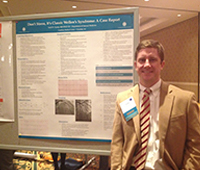 |
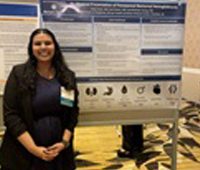 |
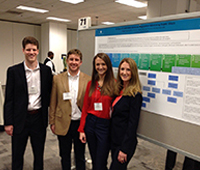 |
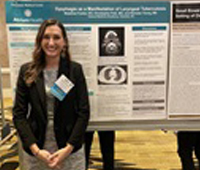 |
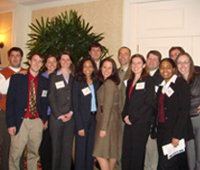 |
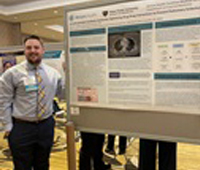 |
Scholarly Activities
2025
- A Therapeutic Conundrum: Malignancy-Associated Thrombotic Thrombocytopenic Purpura
- If Birds Could Kill: A Case of Hypersensitivity Pneumonitis Secondary to Longstanding Cockatiel Exposure
- Unmasking Acute Hepatitis: A Case of Apetamin-Induced Liver Injury
- Silent Susceptibility: Infective Endocarditis in a Young Male with an Undiagnosed Bicuspid Aortic Valve
- A Diagnostic Dilemma: Primary Testicular Lymphoma Masquerading as Refractory Epididymitis
- A Case of Kikuchi-Fujimoto Disease in a Young African American Man
- Evaluating Abnormalities of the Recto-Anal Inhibitory Reflex in Patients with Diabetes Mellitus vs Healthy Controls
- Hemostatic Hydrogel in Gastric Variceal Management
- Hepatic Infiltration and Failure by IgA Kappa Multiple Myeloma
- The “Volcano Sign” on Screening Colonoscopy: A Case Report of Appendiceal Mucocele as a Finding of Underlying Appendiceal Carcinoma
- A Case of Extrapulmonary Tuberculosis Mistaken as Sarcoidosis
2024
- Primary Hyperaldosteronism: Avoiding Diagnostic Anchoring with Atypical Symptoms
- Cushings & Cancer: A Case of Ectopic ACTH Syndrome in SCLC
- HSV-2 Hepatitis: A Severe Presentation of an Uncommonly Recognized Disease
- Stage IV enteropathy-associated T-cell lymphoma simulating acute cholestatic hepatitis in a patient with refractory celiac disease type II
- Metastatic Head and Neck Squamous Cell Carcinoma Causing ST Segment Myocardial Infarction
- Impact of social determinants of health (SDH) on systemic therapy and survival in young women with breast cancer
- A Rare Case of Adrenocorticotropic Hormone (ACTH)-producing Metastatic Pheochromocytoma
- Rapid Clinical Deterioration In A Patient With Cellulitis: An Unusual Presentation Of Catastrophic Antiphospholipid Syndrome
- A rare complication of orthotopic heart transplant: Isolated angioinvasive hepatosplenic mucormycosis due to Mucor indicus
- Ablation of Persistent Atrial Fibrillation in a Patient with Cardiogenic Shock on VA Ecmo
- A Rare Case of Left Hemicolectomy Masking the Signs and Symptoms of Underlying Hirschsprung’s Disease in an Adult
